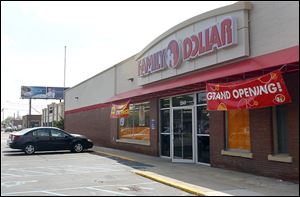
Dollar General makes $9.7B Family Dollar counterbid
8/19/2014
Family Dollar confirmed Monday that it had received Dollar General’s offer, saying it would carefully review the bid.
NEW YORK — Dollar General Corp. offered $9.7 billion for Family Dollar Stores Inc., setting off a bidding war for a company that had agreed to an $8.5 billion takeover by Dollar Tree Inc. last month.
Dollar General offered to pay $78.50 a share in cash, compared with Dollar Tree’s bid of $74.50 a share in cash and stock, according to a statement Monday. The deal would generate $550 million to $600 million in cost savings annually three years after its completion, Dollar General said.
The Goodlettsville, Tenn., retailer is fighting to keep its perch at the top of the dollar-store industry. A merger between its two rivals would have created a new market leader, escalating competition at a time when Wal-Mart Stores Inc. also is looming with new smaller-format stores.
Family Dollar, of Matthews, N.C., confirmed Monday that it had received Dollar General’s offer, saying it would carefully review the bid.
“Dollar General didn’t need to do this because they could have grown nicely without Family Dollar,” said Patrick McKeever, managing director with MKM Partners in Stamford, Conn. But the combination of Family Dollar and Dollar Tree “would represent a marginal long-term threat to market share.”
The Dollar General chain is more similar to Family Dollar, meaning it may be able to extract bigger benefits from a takeover than Dollar Tree, according to Poonam Goyal, a senior retail analyst for Bloomberg Intelligence. The company’s $600 million in annual cost savings from the merger is twice what Dollar Tree estimated in its deal to buy Family Dollar.
While Dollar Tree caters to middle-class consumers and sells most items for $1, the other two dollar chains focus on low-income shoppers and offer more food at various price points. If combined, Dollar General and Family Dollar would have about $28 billion in annual revenue.
“Dollar General can more easily justify a higher price because of the greater potential operating synergies,” said Erik Gordon, a professor at the University of Michigan’s Ross School of Business. Still, Dollar Tree may have incentive to come back with a counteroffer, he said. “The acquisition would do more to transform Dollar Tree’s business.”
Dollar General rose 12 percent to $64.14 a share at the close in New York, underscoring investors want of the company to consolidate the industry. Family Dollar shares rose 4.9 percent to $79.81, while Dollar Tree fell 2.4 percent to $54.26.
The offer is 5.4 percent higher than Dollar Tree’s bid and 29 percent above Family Dollar’s stock price on the last trading day before the earlier deal was announced on July 28. Family Dollar’s shares have traded at or above the Dollar Tree offer over the past three weeks, signaling that investors were expecting a higher bid.
Randy Guiler, a spokesman for Dollar Tree of Chesapeake, Va., declined to comment on Dollar General’s offer or say whether his company planned to continue pursuing Family Dollar. Based on the potential earnings of a combined company, Dollar General could probably afford to make a bid of as much as $85, Mr. McKeever said.